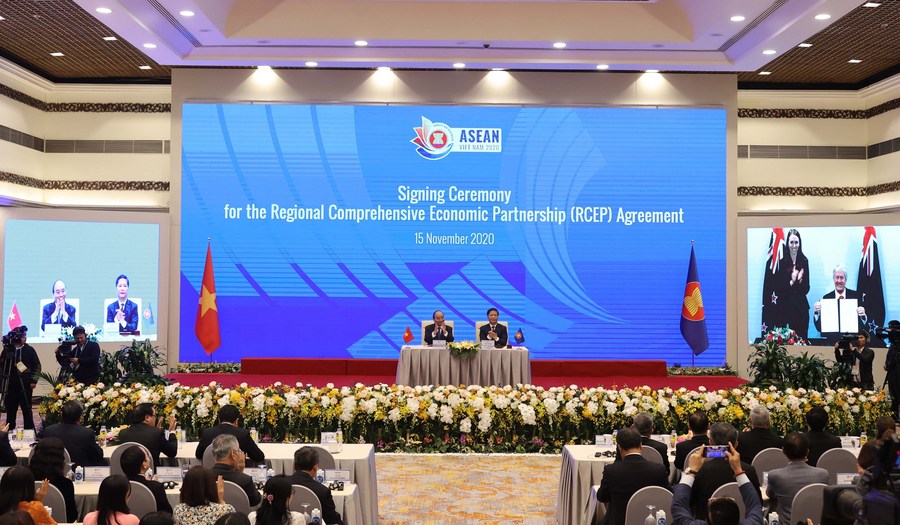RCEP to boost to regional economic recovery amid COVID-19: Chinese envoy


JAKARTA -- The signing of the Regional Comprehensive Economic Partnership (RCEP) is a major boost to regional and global economic recovery under the new normal of COVID-19 situation, the Chinese ambassador to ASEAN said on Sunday.
In a written interview with Xinhua, Deng Xijun, Chinese ambassador to ASEAN, noted that the signing of the trade deal itself has given a strong shot in the arm to regional and global economic recovery and set an example on a global scale.
It also sent a powerful message to the world -- "in order to defeat COVID-19 and promote recovery, we must adhere to and rely on international cooperation," he said.
Deng said once the RCEP enters info force, its dividends will be more visible and lasting. "It will promote trade and investment growth and regional economic integration in the Asia-Pacific, strengthen stability and connectivity of regional industrial chains and supply chains, increase employment, and spur economic growth."
Ten member countries of the Association of Southeast Asian Nations (ASEAN) and China, Japan, South Korea, Australia and New Zealand signed the RCEP on Sunday, launching the world's biggest free trade bloc.
The agreement will show support to the open, inclusive and rule-based multilateral trading system, boost global economic confidence, and contribute to regional and global economic recovery and development, the ambassador said.
The RCEP is the largest free trade agreement in the world, which covers a market of 2.2 billion people with a combined GDP of $26.2 trillion, or 30 percent of global GDP, and accounts for nearly 28 percent of global trade based on data in 2019, according to Deng.
The RCEP comprises a diverse mix of developed, developing and least developed economies of the region with various cultural backgrounds and political systems.
"The fact that these diversified countries could unite and reach a pact, demonstrates the tremendous appeal of free trade and win-win cooperation," Deng said.
The ambassador said the RCEP agreement is a modern, comprehensive, high-quality and mutually beneficial agreement.
"Aside from the specific provisions that cover trade in goods and services, and investment, the RCEP also includes chapters on new areas such as intellectual property, electronic commerce, competition, small and medium enterprises (SMEs), economic and technical cooperation and government procurement," he said.
Ambassador Deng said the agreement is the most ambitious free trade agreement initiated by ASEAN. Over the past eight years, ASEAN has maintained its role as a leader, actively pushed forward the negotiation process.
"China appreciates and thanks ASEAN for its superb leadership and tremendous hard work in advancing the RCEP process," he said.
Deng said all parties also spoke highly of China's role in the negotiations. "In the first half of this year, China has completed all substantive negotiations involving China, leading the way among the members, and laying a solid foundation for the signing of the RCEP as scheduled."
He said that the priority task for all parties is to ensure RCEP enters into force at an early date.
"In the future, as the potential of the RCEP continues to be unleashed after its entry into force, it may attract more countries to be involved," said the ambassador.
- RCEP trade deal an 'incredibly important agreement': Australian trade minister
- RCEP pact 'victory of multilateralism, free trade'
- Bloc will be catalyst for global recovery
- RCEP significant opening move for regional economic integration: China Daily editorial
- RCEP free trade deal signed among 15 participating countries



































